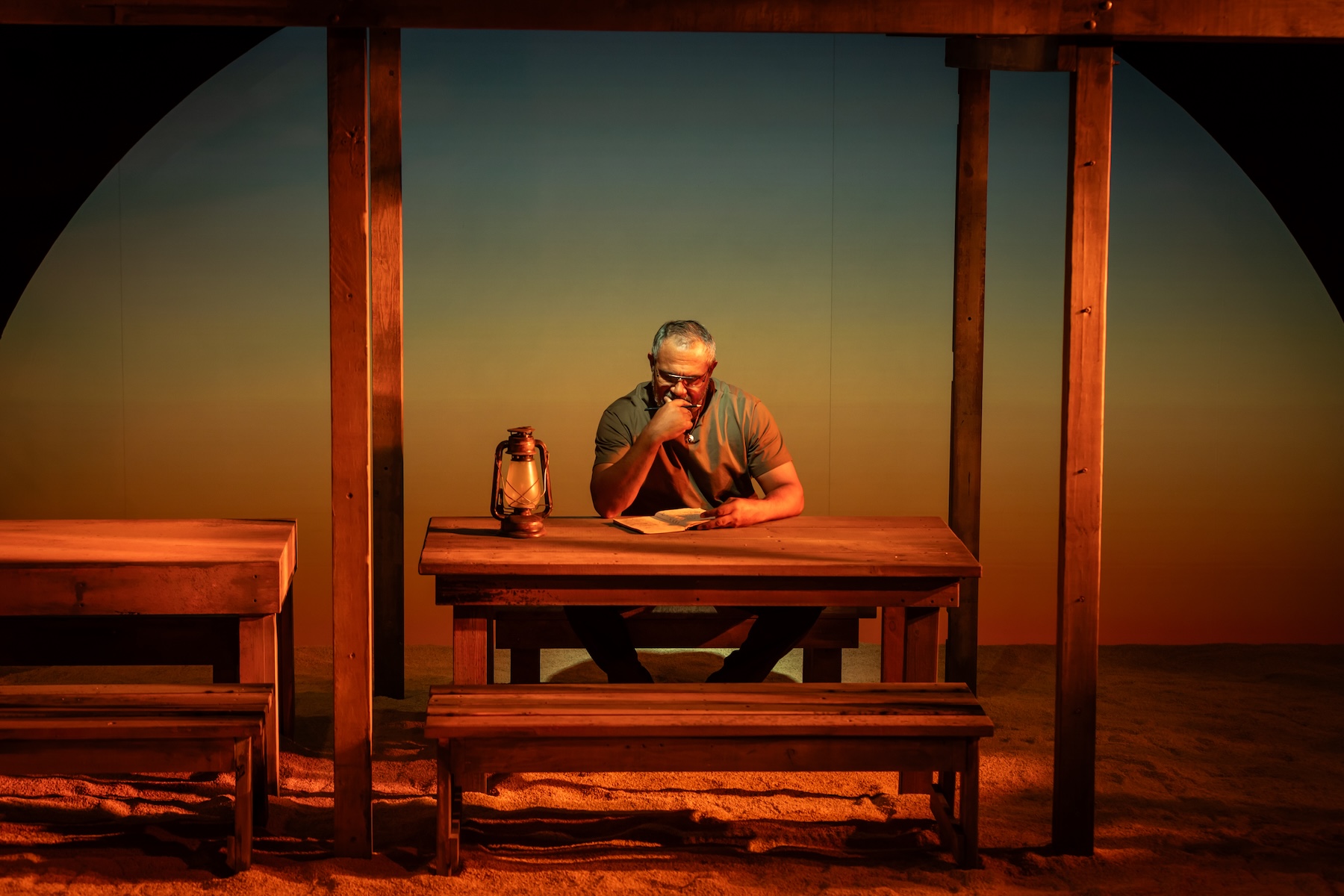Theatre review: Dear Son
Dear Son reflects on the histories, kinship and survival of First Nations fathers and sons in an intergenerational night of theatre that invites audiences to sit with vulnerability, truth and love.

There’s a saying – men don’t talk.
Or rather men don’t ‘talk talk’.
We talk about food, cars, politics.
Anything, but what’s really going on.
– John Harvey, Dear Son co-adaptor
Dear Son, based on the book by Thomas Mayo, is a reflection of love, loss and resistance through letters from First Nations fathers and sons. Directed by Issac Drandic (Noongar), who co-adapted the work alongside John Harvey (Saibai Island), this State Theatre Company South Australia and Queensland Theatre co-production is a story that’s not here to fix, but rather, to acknowledge, identify and understand the struggle and where it began.
The cast, consisting of five men First Nations men, are not only actors but fathers and sons themselves. Jimi Bani (Wagadagam), Waangenga Blanco (Pajinka Wik, Meriam Mer), Kirk Page (Munanjali, Badu Island), Aaron Pederson and Tibian Wyles (Warrgamay, Girramay and Kalkadoon) welcome us with a smile, waving as the set is lit with a sunset hue. A tree stands to the side of a wooden veranda and underneath are picnic tables with oil lamps. They stand strong on sand-covered ground and a small campfire is lit. They gently begin shouting languages groups, grounding where these fathers come from, before landing on Kaurna Yarta.
The prologue is where the interconnectedness of experience is formed. One father begins the struggle of writing a letter to his son and there’s a frustration present. As the other men walk in, ready to complete a roofing task, they take notice. It is here where feelings of being a father, a Blak father, open.
Act Two: Letters of Loss
Although the nature of this story is quite lighthearted through playfulness and use of humour, Blak and boy-like, Letters of Loss doesn’t shy away from what First Nations men, fathers and sons have had to resist. Throughout this scene the audience are reminded of Mabo and the overruling of terra nullius which led non-Indigenous people to believe First Nations people would kick them out of their homes, the abuses at Don Dale, the Northern Territory Intervention and the climate crisis creating high sea levels in the Torres Strait – all a reminder that we live in state of colonisation and that their anger is their right.

Act Three: Letters of Love
But amongst the continual threats of colonisation we are reminded of the power of using our language. Archival recordings of Palawa Kani are shared with the audience and I personally felt a deep pride in experiencing these sounds. Our language is the thread that connects us to Country and those that walked before us. Another father reminisces on a story about his father and the importance of him passing on that knowledge for survival.
Subscribe for updates
The childlike presence in the way these fathers and sons interact on stage, playing like boys, made my heart feel warm witnessing the softness that becomes present in how they share and hold space for vulnerability and despite the everyday, Jimi, Waangenga, Kirk, Aaron and Tibian end the dialogue with their personal hopes. They share hopes for the continuum of language – it’s yours forever – that the next generation of fathers and son will have better experiences than they have, and to embrace difference and find happiness wherever it lies.
Our Blak men are our warriors, they are our first inventors, our thread that also connects the past to the present, pulling strength from our Ancestors. I reminisce on my patriarchal bloodline and what they have done in order to protect, rebuild and continue our survival.
Dear Son represents fathers and sons of the oldest living culture in the world, our storytellers, and you must listen to what they have to share.
Dear Son continues at the Odeon Theatre, Norwood, until August 16
Jayda Wilson is Gugada and Wirangu artist and writer with Thai ancestry based on Kaurna Yarta, Adelaide, and the latest recipient of the Create SA and InReview First Nations Arts Writing Mentorship. Jayda is working with mentor K.A. Ren Wyld, an award-winning author and critic of Martu descent based on Kaurna Yerta, to write a series of articles for publication in InReview
Free to share
This article may be shared online or in print under a Creative Commons licence

